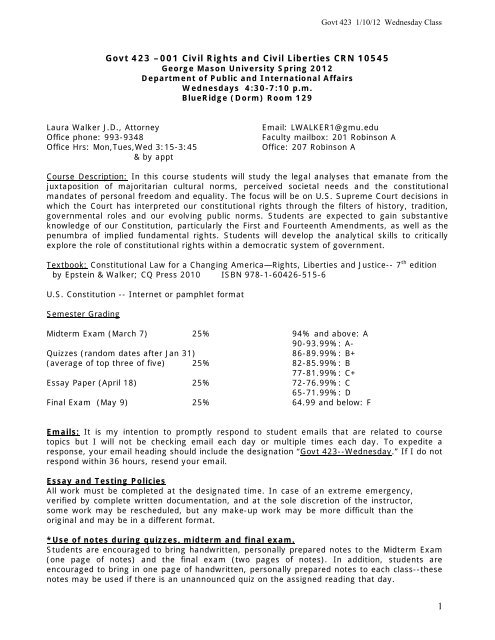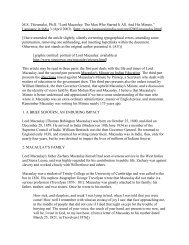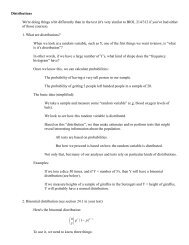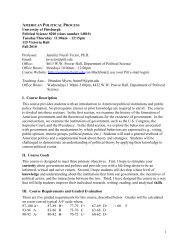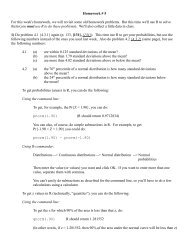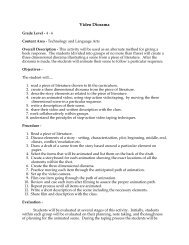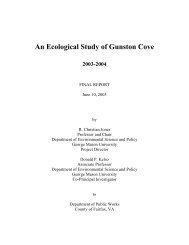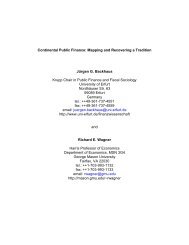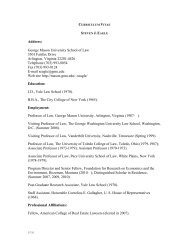GOVT 423 syllabus - George Mason University
GOVT 423 syllabus - George Mason University
GOVT 423 syllabus - George Mason University
You also want an ePaper? Increase the reach of your titles
YUMPU automatically turns print PDFs into web optimized ePapers that Google loves.
Govt <strong>423</strong> 1/10/12 Wednesday Class<br />
Govt <strong>423</strong> –001 Civil Rights and Civil Liberties CRN 10545<br />
<strong>George</strong> <strong>Mason</strong> <strong>University</strong> Spring 2012<br />
Department of Public and International Affairs<br />
Wednesdays 4:30-7:10 p.m.<br />
BlueRidge (Dorm) Room 129<br />
Laura Walker J.D., Attorney<br />
Office phone: 993-9348<br />
Office Hrs: Mon,Tues,Wed 3:15-3:45<br />
& by appt<br />
Email: LWALKER1@gmu.edu<br />
Faculty mailbox: 201 Robinson A<br />
Office: 207 Robinson A<br />
Course Description: In this course students will study the legal analyses that emanate from the<br />
juxtaposition of majoritarian cultural norms, perceived societal needs and the constitutional<br />
mandates of personal freedom and equality. The focus will be on U.S. Supreme Court decisions in<br />
which the Court has interpreted our constitutional rights through the filters of history, tradition,<br />
governmental roles and our evolving public norms. Students are expected to gain substantive<br />
knowledge of our Constitution, particularly the First and Fourteenth Amendments, as well as the<br />
penumbra of implied fundamental rights. Students will develop the analytical skills to critically<br />
explore the role of constitutional rights within a democratic system of government.<br />
Textbook: Constitutional Law for a Changing America—Rights, Liberties and Justice-- 7 th edition<br />
by Epstein & Walker; CQ Press 2010 ISBN 978-1-60426-515-6<br />
U.S. Constitution -- Internet or pamphlet format<br />
Semester Grading<br />
Midterm Exam (March 7) 25%<br />
Quizzes (random dates after Jan 31)<br />
(average of top three of five) 25%<br />
Essay Paper (April 18) 25%<br />
Final Exam (May 9) 25%<br />
94% and above: A<br />
90-93.99%: A-<br />
86-89.99%: B+<br />
82-85.99%: B<br />
77-81.99%: C+<br />
72-76.99%: C<br />
65-71.99%: D<br />
64.99 and below: F<br />
Emails: It is my intention to promptly respond to student emails that are related to course<br />
topics but I will not be checking email each day or multiple times each day. To expedite a<br />
response, your email heading should include the designation “Govt <strong>423</strong>--Wednesday.” If I do not<br />
respond within 36 hours, resend your email.<br />
Essay and Testing Policies<br />
All work must be completed at the designated time. In case of an extreme emergency,<br />
verified by complete written documentation, and at the sole discretion of the instructor,<br />
some work may be rescheduled, but any make-up work may be more difficult than the<br />
original and may be in a different format.<br />
*Use of notes during quizzes, midterm and final exam.<br />
Students are encouraged to bring handwritten, personally prepared notes to the Midterm Exam<br />
(one page of notes) and the final exam (two pages of notes). In addition, students are<br />
encouraged to bring in one page of handwritten, personally prepared notes to each class--these<br />
notes may be used if there is an unannounced quiz on the assigned reading that day.<br />
1
Govt <strong>423</strong> 1/10/12 Wednesday Class<br />
Notes can be prepared subsequent to a group study session but notes not written by the<br />
individual student cannot be used. Notes must be in paper format; computers cannot be<br />
accessed during a test. Using notes prepared by another student, whether from this semester or<br />
a prior semester, is a violation of the honor code.<br />
*Make up Work<br />
To qualify for a make up work or a delayed assessment:<br />
Submit a written explanation/documentation within four days of the missed assessment.<br />
Emailed explanations do not fulfill the requirement for submitted documentation but the<br />
applicable email may be printed, signed, and submitted as the written explanation.<br />
A request for a make up assessment/assignment must be based on a personal, unavoidable<br />
problem that made attendance exceedingly difficult. A substitute assignment may be more<br />
difficult than the original and may be in a different format. Make up quizzes will be given on the<br />
day of the final exam to those who qualify. A make up quiz can be based on the reading for any<br />
day of the semester and will not necessarily coincide with the day the student was absent from<br />
class.<br />
A request for an extension of time for the essay assignment is rarely granted; however any such<br />
request will be considered if the request is timely and well documented.<br />
Submission of Essay and Grading Penalty<br />
The Essay Paper must be submitted both to Blackboard and in hardcopy paper format in class on<br />
the due date, by the designated time. (April 18 - 4:40 in class, 4:30 to Bb.) A late dual<br />
submission of a paper without legitimate excuse, written documentation and instructor approval<br />
of the delay, can result in a reduction of fifteen grading points for each day it is late. The daylate-penalty<br />
will be assessed in full immediately after the designated submission time and such<br />
penalty will reoccur and accumulate each subsequent day at the same designated time.<br />
An emailed or Blackboard submitted paper cannot substitute for the hardcopy submission.<br />
However, if a student has a genuine emergency that makes on-time delivery of the paper version<br />
impossible, the student can (1) Blackboard and email the paper by deadline, (2) assure that the<br />
emailed paper was received, (3) submit the hardcopy within 5 days, (4) attach documentation of<br />
the emergency to the hardcopy and (5) attach a copy of the email related to the original<br />
submission of the paper. Following all these steps may result in a waiver or diminution of the late<br />
penalty. A paper submitted subsequent to deadline should follow the same steps. In some cases<br />
the date/time of the electronic late submission can qualify as the cut off for the accrual of<br />
penalties, provided that the remaining steps listed above are followed.<br />
Work in progress should be saved in multiple formats on a regular basis well in advance of the<br />
actual due date. Last minute problems do not usually qualify as valid reasons for a late paper.<br />
2
Summary of course work:<br />
Govt <strong>423</strong> 1/10/12 Wednesday Class<br />
1. Class Attendance and Participation: Students are expected to attend classes on a regular<br />
basis and to be fully prepared to discuss that day’s reading assignment. Students should arrive<br />
on time and stay until the end of class. In-class computer use must be related to this course.<br />
Students may not use other telecommunication devices during class time. Students will be called<br />
on randomly to discuss the day’s reading.<br />
2. Quizzes (random unannounced dates after January 31) (25% of final grade):<br />
On random dates students will be given a quiz on that day’s reading assignment and current<br />
class material. The top three quiz grades will be averaged for the grade in this category.<br />
Students may use one page of handwritten notes for any quiz. If a quiz is given at the beginning<br />
of the class session, students who arrive late may not be able to take the quiz.<br />
3. Midterm Exam (March 7) (25% of final grade):<br />
The midterm will cover the reading and lectures from the beginning of the term. At the teacher’s<br />
discretion, students who arrive more than 10 minutes late may not be able to take the test.<br />
Students may use one page of handwritten notes for this test. Scantron 882-E needed<br />
4. Essay Paper (April 18 – 4:40 in class, 4:30 to Bb) (25% of final grade):<br />
Each student must write a six to ten page essay in response to a legal scenario that will<br />
be provided by the teacher. There will be a separate document that gives the instructions<br />
for this writing assignment but the main task is to use only designated material from this<br />
course 1 to analyze the scenario.<br />
Grade: 30% writing; 35% selection & use of case law; 35% analysis<br />
Generally, students may revise their graded Essay Paper for a chance to earn a maximum of ten<br />
additional points up to a revised final grade of 95. Students who submit a late paper may not<br />
earn back the penalty points and may only earn a maximum revised grade of 90. Revisions will<br />
only be examined if the following rules are met: (a) return the original graded paper (with my<br />
marks on it and the attached grading sheet), (b) submit a revised paper, (c) highlight the<br />
changes & additions on the revised version so I can immediately and efficiently know how you<br />
revised the original paper. If these conditions are not met, there will be no change in the paper<br />
grade.<br />
The number of revision points is at the discretion of the professor, based on a student’s<br />
meaningful efforts at revision, and will not follow the original grading categories for the essay.<br />
5. Final Exam (4:30 Wednesday, May 9) (25% of final grade):<br />
The final exam will take place on May 9, beginning at 4:30 and concluding at 5:45 p.m. The test<br />
will be cumulative and will require the use of a Scantron form 882-E. Students may bring two<br />
pages of handwritten notes to this test.<br />
1 Only certain court case decisions will qualify; details will be in the instruction sheet.<br />
3
Other course information:<br />
Govt <strong>423</strong> 1/10/12 Wednesday Class<br />
Class Syllabus and GMU Email Accounts<br />
The instructor may modify the attached class schedule and any such change will be<br />
announced in class and/or by email or Blackboard at the earliest opportunity. Students<br />
must activate their GMU email and Blackboard accounts and check for class notices on a<br />
regular basis.<br />
Class Enrollment<br />
Each student should verify enrollment in this class with the registrar's office no later than<br />
January 31. This is also the last day to drop this class without any tuition penalty.<br />
February 24 is the last day to drop this class--with a severe tuition penalty. After this date,<br />
withdrawing requires approval from a dean and must be based on non-academic reasons.<br />
Undergraduate students may qualify for a selective withdrawal. See the Schedule of Classes for<br />
selective withdrawal procedures and the deadline for this option. Students with nonacademic<br />
special hardships may also qualify for an Incomplete per university procedures.<br />
HONOR CODE<br />
The GMU Honor Code requires the highest standards of academic honesty and integrity.<br />
Cheating, plagiarism, lying and stealing are prohibited. All violations of the Honor Code will be<br />
reported. See honorcode.gmu.edu for more information.<br />
If a student’s academic work or any communication related to this course contains an honor<br />
code violation, the student's work product may receive a grade of zero. In most instances a<br />
violation of the honor code results in a failing grade for the entire semester. Students may freely<br />
discuss this course's assignments with others, may form study groups, and may seek feedback<br />
and guidance from others. However, all work products, as well as the notes permitted for tests,<br />
must be the sole work of the individual student. Students may discuss the essay assignment<br />
with other students but these discussions should not result in a shared outline for the final<br />
paper.<br />
Academic and/or Physical Accommodations<br />
Students must notify the instructor as soon as possible regarding any special needs. Many<br />
requests for academic accommodations should be initially processed through the Office of<br />
Disability Resources. This office can be reached at 993-2474.<br />
4
Schedule of Reading Assignments<br />
Govt <strong>423</strong> 1/10/12 Wednesday Class<br />
*Some supplemental cases will be assigned and posted on Blackboard.<br />
On all class meeting dates students should complete the designated reading prior to the class<br />
session. Unless otherwise indicated, the page number indicates the first page of the assigned<br />
case—these cases should be read in their entirety as presented in the textbook.<br />
Class # 1 Wednesday, January 25 Introduction<br />
Introduction—p. 3 to 31, 47-48; 57-65<br />
Review 14 th Amendment section 1 & 5 (749) Marbury v. Madison (48) Table (581), Crawford v.<br />
Marion County (707)<br />
Class # 2 Wednesday, February 1 Equal Protection<br />
Plessy v. Ferguson (586), Sweatt v. Painter (591), Brown v. Bd. of Education (594), Swann v.<br />
Charlotte-Mecklenburg (601), Loving v. Virginia (612)<br />
Class # 3 Wednesday, February 8 Equal Protection<br />
Shelley v. Kraemer (617), Moose Lodge v. Irvis (622), Reed v. Reed (626), Craig v. Boren<br />
(630), United States v. Virginia (635) Romer v. Evans (643)<br />
Class # 4 Wednesday, February 15 Equal Protection & Autonomy<br />
San Antonio v. Rodriguez (650), Plyler v. Doe (656 skim read only), Grutter v. Bollinger (676)<br />
PICS v. Seattle School District (606), Miller v. Johnson (729)<br />
Class # 5 Wednesday, February 22 Autonomy<br />
Griswold v. Connecticut (388), Roe v. Wade (396 skim read only), Planned Parenthood v. Casey<br />
(409), Lawrence v. Texas (422), Boy Scouts v. Dale (285)<br />
Class # 6 Wednesday, February 29 Freedom of Expression<br />
Schenck v. United States (196), Abrams v. United States (198), Gitlow v. New York (204),<br />
Brandenburg v. Ohio (219) United States v. O’Brien (227)<br />
Review for Midterm<br />
Essay Assignment emailed and discussed<br />
Class # 7 Wednesday, March 7 Midterm & Freedom of Expression<br />
Midterm 4:30-5:10<br />
Class lecture 5:25-6:45<br />
Tinker v. Des Moines (257) Texas v. Johnson (230), Chaplinsky v. New Hampshire (235), Cohen<br />
v. California (237)<br />
No Class on March 14—Spring Break<br />
Class # 8 Wednesday, March 21 Freedom of Expression<br />
Hill v. Colorado (243), R.A.V. v. City of St. Paul (251), West Virginia v. Barnette (266) Rumsfeld<br />
v. FAIR (270), Hazelwood v. Kuhlmeier (303), Red Lion v. FCC (310/Internet) Morse v. Frederick<br />
(261)<br />
5
Govt <strong>423</strong> 1/10/12 Wednesday Class<br />
Class # 9 Wednesday, March 28 Freedom of Expression<br />
Miller v. California (327), New York v. Ferber (333), Ashcroft v. Free Speech Coalition (365 &<br />
Internet), New York Times v. Sullivan (339), Gertz v. Welsh (347), Hustler v. Falwell (352),<br />
Citizens United v. FEC (Internet), Doe v. Reed (Internet)<br />
Class # 10 Wednesday, April 4 Freedom of Religion<br />
Cantwell v. Connecticut (101), Sherbert v. Verner (106), Wisconsin v. Yoder (110), Oregon v.<br />
Smith (116), City of Boerne v. Flores (124 only the majority view) Everson v. Bd. of Education<br />
(130), Everson v. Bd. of Education (130)<br />
Class # 11 Wednesday, April 11 Freedom of Religion<br />
Lemon v. Kurtzman (139), Zelman v. Simmons-Harris (154), Edwards v. Aguillard (165),<br />
Abington Township v. Schempp (171), Lee v. Weisman (178), Santa Fe v. Doe (183/Internet),<br />
Lynch v. Donnelly (185/Internet), County of Allegheny v. ACLU (185/Internet), Van Orden v.<br />
Perry (186)<br />
Class # 12 Wednesday, April 18 Essay Due and Search and Seizure<br />
*Essay due in classroom by 4:40, to Bb by 4:30<br />
early submissions to faculty office/mailbox no later than 4:15 p.m.<br />
Lecture begins at 4:40<br />
Katz v. United States (451), Mapp v. Ohio (478), Terry v. Ohio (473), Arizona v. Gant (463),<br />
Herring v. United States (494), Safford Unified School District v. Redding (468)<br />
Class # 13 Wednesday, April 25 Criminal Justice; Second Amendment<br />
Powell v. Alabama (520), Gideon v. Wainwright (524), Miranda v. Arizona (502), Gregg v.<br />
Georgia (553 to top of 558), Atkins v. Virginia (562), D.C. v. Heller (377)<br />
Class # 14 Wednesday, May 2 Rights in National Crises and Semester Review<br />
D.C. v. Heller (377), Korematsu v. United States (Internet), Eisentrager v. Johnson (Internet),<br />
Hamdi v. Rumsfeld (Internet) and Boumediene v. Bush (Internet)<br />
Review for End of Term Test<br />
& Graded Essays Returned<br />
Wednesday, May 9 4:30 to 5:45 p.m. Final Exam<br />
Final Exam Scantron 882-E needed<br />
Revised papers due at the end of the exam period.<br />
Make up quizzes will be given to those who qualify—<br />
only notes prepared in advance of lectures may be used for a make up quiz<br />
6


